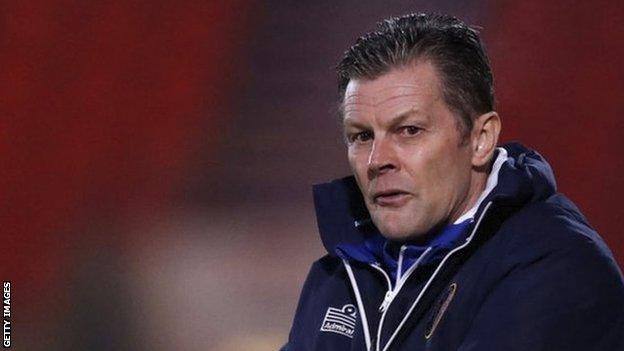Steve Cotterill: Shrewsbury Town manager warns of long Covid effects
- Published

Shrewsbury Town manager Steve Cotterill first tested positive for Covid-19 on 1 January
Shrewsbury boss Steve Cotterill says it is vital people understand the physical and mental effects Covid can have after his long-term struggles left him so weak he could barely fill a kettle.
The 56-year-old former Nottingham Forest and Birmingham City manager first caught coronavirus in January.
He spent time in intensive care before being readmitted with Covid-pneumonia.
Cotterill, who returned to pre-season training on 1 July, was "gravely ill" and said his recovery has been slow.
"I was in a bad way," he told BBC Radio Shropshire.
"I have fought really hard to get where I am and I have to keep on fighting.
"To start with I felt I was not getting fit enough quick enough, but I had to realise where I was having been in intensive care."
Cotterill is back at work but is managing his workload, something he had previously admitted he was not very good at.
"I'm feeling much better than I was," added Cotterill.
"It takes longer to get breath back and talking sometimes can be as tough as riding a Wattbike. I have to be mindful of taking a step back every now and again - and I have got better at it.
"Even holding the kettle under the tap when you are as weak as I was felt heavy. Small things that I can do now were tough - like just getting up out of a chair."
Cotterill, who is 57 on 20 July, said he always took pride in keeping himself fit but is still on steroids. He is upping his exercise regime on a daily basis and making good progress.
"I am not looking for any sympathy," he added, saying he is desperate to help people deal with long Covid.
'I knew I was in trouble'
"It's not about me it's about the people still suffering from it. You have to keep hanging on in there. You will be getting better and must fight," Cotterill said. "Don't get too down, mentally or physically.
"Exercise is so important for the lungs and heart. It will tire you out, but have to do it. Accept where you are; you can't do everything so don't overwork yourself. It's tough to get over.
"It's very difficult to understand if you haven't had it."
Cotterill spent just shy of 50 days in hospital during two spells.
On the first occasion he was taken by ambulance after he got progressively worse after a 10-day spell isolating.
"I was mainly sleeping when I was isolating," he said. "It was a tough 10 days and then I went home for three or four days and was almost being force-fed. I wasn't getting better and I knew I was in trouble.
"The coughing was relentless and one morning I thought I was going to faint. I was poorly for a while when I went into hospital and I knew I was in a bad way."
Live and learn and a football focus
The road to returning to pre-season training has been tough but has brought a welcome and much-needed distraction.
"I had a goal to be back here. I knew I had to be here by 1 July," Cotterill said.
"I have a very good set of staff who I trust implicitly and they were incredible while I was away. It made me realise I have to be a better delegator. I have never been a very good delegator and it is wrong because the more I include people, the more valued they will feel and the more they will feed back.
"I have been wrong with that over the years.
"Being ill won't make me any more desperate not to win a game on a Saturday and any more lenient with the boys in training if I don't think they are doing what I want. I will have my moments.
"The big thing is about helping other people with this now. It has made me appreciate life.
"But I'm OK, I'm here, fit, strong and healthy but not quite as fit, strong and healthy as I was. But I will get back there. It will take me a bit of time, but I will get back there - definitely."

The tough questions facing Uefa: The Sports Desk team look at the problematic side of Euro 2020
Will colonising Mars save the Earth?: Why Elon Musk believes it's our only hope
